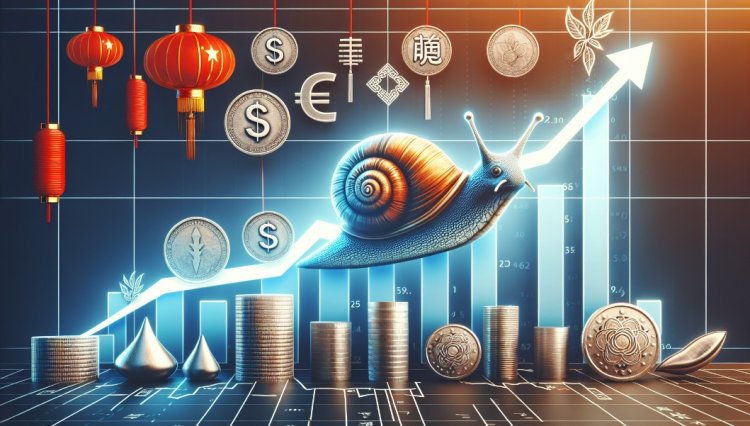The Economic Slowdown in China: Reasons and Consequences
China, economic slowdown, reasons, consequences, property market, debt burden, domestic consumption, global markets, supply chain disruptions, policy responses, future outlook, economic growth, unemployment, social stability, global trade, inflation, zero-COVID policy, demographic shift, energy crisis, tech sector crackdown, regional disparities, investment slowdown, financial instability, risk assessment, market volatility, economic diversification, policy reforms, sustainable growth, international relations, global economic recovery, trade tensions, US-China relations, emerging markets, financial markets, economic indicators, Chinese consumers, manufacturing, infrastructure, Belt and Road Initiative.

Introduction
The protests in China and the calls for Xi Jinping to step down have drawn attention to the economic crisis facing the country. China's economy has been a major player on the world stage over the past three decades, driving growth and investment. However, the transition from rapid economic growth to the current slowdown has raised concerns about the causes of the economic crisis in China and its impact on the global economy.
Understanding the reasons for the economic crisis in China is crucial due to the importance of the Chinese economy in the global context. China's economy is the second largest in the world and a collapse would have far-reaching consequences that would affect not only China but many countries around the globe.
The slowdown in the Chinese economy is particularly worrying because deflationary pressures are causing prices to fall. While this may seem like good news for consumers, it is actually leading to a decline in spending and investment, which can have a detrimental effect on the economy as a whole. It is important to understand the causes of the economic crisis in China to understand the potential impact and find possible solutions.
Reason 1: Deflation
Deflation refers to a fall in the general price level of goods and services over time. At first glance, this may seem like good news for consumers, but it can hurt the economy as a whole.
When people expect prices to fall, they tend to postpone purchases, leading to a decline in spending and investment. If consumers believe that prices will continue to fall, they may adopt a deflationary stance and postpone purchases in the hope of a better deal in the future.
When comparing deflation and inflation, it can be more difficult for companies to deal with deflationary pressures. Inflation, where prices are rising, can be combated by adjusting interest rates or other measures to control spending. However, reversing a deflationary stance is much more difficult.
Companies face several challenges in a deflationary economy. One major challenge is the difficulty of maintaining profitability. When prices fall, it can become difficult for companies to sell their products at a price that covers their costs. This can lead to lost sales and potential losses, making it difficult for companies to stay afloat.
In addition, a deflationary economy can lead to uncertainty and hesitation among consumers. As prices fall, consumers may postpone purchases, which can further dampen demand and slow economic growth.
In the case of China, the deflationary mindset is compounded by other factors such as the lack of government stimulus during the pandemic and the ongoing trade war with the United States. These factors contribute to a sense of uncertainty and a reluctance to spend, further exacerbating the economic downturn.
Reason 2: Lack of Government Support
One of the main factors behind China's economic downturn is the lack of government support, especially compared to the stimulus packages in the United States. During the pandemic, the Chinese government did not distribute stimulus checks to its citizens, so they had to rely solely on their own savings and limited income to survive.
While stimulus checks were not a perfect solution in the US, they did provide some relief and allowed people to continue spending money and support the economy. In contrast, the lack of government support in China has created a sense of insecurity among the population, which has led to a reluctance to spend.
Limited government support has also impacted consumer spending. In the absence of a safety net and financial support, people in China are cautious about using their savings and prefer to save their money for future emergencies. This lack of spending is further exacerbating the economic downturn as consumer spending is crucial to economic growth.
In addition to limited government aid, China also has low-interest rates, currently at 3.5%. Despite these low-interest rates, individuals and companies are reluctant to borrow money. Uncertainty about the future economic situation and the lack of support from the government make borrowing a risky venture. As a result, people are reluctant to take on debt and make investments, which is exacerbating the economic downturn.
Uncertainty about the future economic situation is a major factor behind the economic crisis in China. The ongoing trade war with the United States, the possibility of further lockdowns, and possible sanctions due to political tensions are creating a climate of uncertainty. In such an uncertain climate, people are naturally reluctant to make important financial decisions, leading to a decline in economic activity.
To summarize, the lack of government support is a major reason for China's economic slowdown. The comparison between the stimulus packages in the US and the lack of support in China illustrates the impact government policy can have on consumer spending. Low-interest rates in China and a reluctance to borrow are also contributing to the economic crisis. Uncertainty about future economic conditions is adding to the general sense of caution and reluctance to spend. Without adequate government support and a favorable economic climate, China's economy faces major challenges if it is to recover and return to its previous levels of growth.
Reason 3: Trade War with the United States
One of the most important factors contributing to China's economic slowdown is the ongoing trade war with the United States. The trade war was triggered by President Trump, who imposed tariffs on Chinese goods, making them more expensive on the US market.
These tariffs had a significant impact on China's economy. Due to the higher prices for their goods in the US, Chinese companies had to accept a drop in demand, which led to a decline in exports. This has led to lower revenues and potential losses for Chinese companies.
In addition, the trade war has led to US companies moving their production out of China. The higher tariffs and uncertainty over trade relations between the two countries have led many US companies to look for alternative manufacturing locations in countries such as India and Vietnam, where labor costs are lower.
This loss of manufacturing has had a significant impact on the Chinese economy, which was previously a major manufacturing base for US companies. The relocation of manufacturing out of China has led to job losses and a decline in economic activity.
In the long term, the trade war with the US has the potential to further impact the Chinese economy. The uncertainty created by the trade war and the possibility of further tariffs or sanctions has created an environment of instability and caution for businesses and consumers.
This uncertainty may lead to a decline in investment and consumer spending, which are important for economic growth. In addition, the trade war has strained diplomatic relations between China and the United States, making it more difficult for the two countries to cooperate on important economic and trade issues.
To summarize, the trade war with the United States is an important factor contributing to China's economic slowdown. The tariffs on Chinese goods, the loss of US companies moving production out of China and the long-term impact on the Chinese economy highlight the negative consequences of the trade war. Resolving the trade war and restoring a stable trade relationship between the two countries is crucial for China's economic recovery and future growth.
Reason 4: Real Estate Collapse
The real estate industry plays a crucial role in the Chinese economy and accounts for around 30% of the entire economy. However, this industry is currently on the verge of collapse, which has a significant impact on China and the global economy.
If the real estate industry in China collapses, it will have far-reaching consequences. Not only would it lead to a decline in construction activity and job losses in the industry, but it would also have an impact on related sectors such as manufacturing, retail, and financial services. In addition, the collapse of the real estate market would lead to a decline in consumer confidence and spending, which would further exacerbate the economic downturn.
The Chinese government has taken measures to prevent a sharp decline in real estate prices. However, these measures may only delay the inevitable outcome. The uncertainty surrounding the economy, including the ongoing trade war with the United States and the possibility of further lockdowns and sanctions, adds to the general caution among investors and potential property buyers.
One of the factors contributing to uncertainty in the real estate market is the large number of vacant homes across China. It is estimated that there are around 60 million empty homes, which is equivalent to the entire population of France. This oversupply of housing creates a sense of instability as potential buyers expect prices to fall further in the future. This reluctance to buy property inhibits economic growth as it reduces demand and investment in the construction sector.
In addition, the deflationary mindset of consumers contributes to uncertainty in the real estate market. When people expect prices to fall, they delay their purchases and wait for better deals in the future. This mentality further dampens demand and slows economic growth.
In summary, the collapse of the real estate sector in China is a major problem for the country's economy and the global economy. The importance of the real estate sector to the Chinese economy, the potential consequences of the collapse, government policies that prevent prices from falling, and the factors contributing to uncertainty are all contributing to the economic slowdown. It remains to be seen how the Chinese government will overcome these challenges and whether it can prevent a complete collapse of the real estate sector.
Reason 5: Need for an Economic Model Shift
China's economic growth in recent decades has been driven by infrastructure development, such as the construction of roads, bridges, and airports. This has led to significant economic growth and lifted millions of people out of poverty. However, relying solely on infrastructure development for economic growth is not sustainable in the long term.
While infrastructure development has contributed significantly to China's economic success, the country faces the challenge of sustaining growth through this model alone. Building more roads and bridges will eventually reach a point where the economic benefits are no longer as great as before. In addition, the cost of maintaining and modernizing existing infrastructure can be significant.
To further boost economic growth, China needs to shift its economic model towards innovation. This means that it must focus on developing new technologies, products, and services that can add value and increase productivity. By investing in research and development and promoting entrepreneurship, China can foster a culture of innovation that will drive future economic growth.
One way to measure a country's level of development is to look at its GDP per capita. China's GDP per capita is currently around 10,000 US dollars, which is significantly lower than that of industrialized countries such as the United States, Japan, and Germany. This shows that China still has a long way to go in terms of economic development.
If China focuses on innovation and changes its economic model, it has the potential to increase its GDP per capita and catch up with industrialized countries. This will not only benefit the people of China but will also have a positive impact on the global economy.
Conclusion
Speculation about China's future as the world's largest economy is a topic of concern given the country's economic slowdown. While China has enjoyed considerable growth in recent decades, the current crisis raises questions about the country's ability to maintain its position as a global economic leader.
The impact of the Chinese slowdown on the global economy is significant. China's economy is the second largest in the world and a collapse would have far-reaching consequences for many countries. Deflationary pressures and the decline in spending and investment are contributing to the overall economic downturn.
As China's manufacturing hub faces challenges, emerging countries such as India and Vietnam are potential replacement locations. These countries offer lower labor costs and attract companies looking to relocate their production.
The Chinese Communist Party's (CCP) response to the economic crisis will play a crucial role. The lack of government support, including limited stimulus packages and low-interest rates, has contributed to the economic slowdown. Uncertainty about future economic conditions and the ongoing trade war with the United States are also contributing to the challenges.
In summary, China's economic slowdown is a cause for concern about its future as the world's largest economy. The impact on the global economy, the emergence of alternative manufacturing bases, and the CCP's response are all factors that need to be considered. Only time will tell how China overcomes these challenges and whether it can regain its previous level of growth.



 admin
admin 










